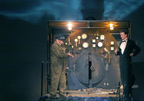

play
The Youth Theatre, Novi Sad, Serbia
Translated from the Polish by: PhD Zoran Đerić
Directed by: Aleksandar Davić
Video: Živa Stanojević
Set: Željko Piškorić
Costumes: Marina Sremac
Choreography: Olivera Kovačević Crnjanski, Frosina Dimovska
C a s t :
SIEGFRIED TENSER / TRÉFALDI: Miroslav Fabri
NICHOLAS SLOBOK / TRAVAILLAC: Ivan Đurić
SOPHIA TENSER:Marina Zubić Cinkocki
JULIA TOMASIK:Jovana Stipić
GUSTER: Ervin Hadžimurtezić
MINNA, COUNTESS DE BАRNHЕLM: Jelica Gligorin
THE THIRD CLASS PASSENGER: Zoran Andrejin
GENDARME: Boško Petrov
MISS MIRA BEAN: Vera Hrđan Ostojić
CONDUCTOR: Emil Kurcinak
DR. MARCELLUS RIFTMAKER: Saša Latinović
MIRA’S BROTHER, VALERY BEAN: Dejan Šarković
RAILWAY GUARD, JOHN CACKLESON: Dragan Zorić
His wife, the beautiful JEANNE CACKLESON: Marina Zubić Cinkocki
The show lasts 60 minutes.
When I first read Witkiewicz’s “The Crazy Locomotive” in the late 1980s I was thrilled, but this feeling was followed by an impression that the play was so bizarre that it made it practically impossible for staging. In the meantime, the 1990s happened to our country so the world, inhabited by characters with only a thin layer of civilisation standing as a barrier for the darkest passions to emerge on the surface, it did not seem so far away any more. The use of video projection in the contemporary theatre became common a long time ago, and the success and justifiability of crossbreeds between theatre and film/video varies from case to case. Witkiewicz’s play takes place almost entirely on a moving locomotive so the author invites the use of film, that is, the medium which best implies a sensation of motion, for more reasons. In my personal case, resorting to technology has no ambition to give actors/actresses a secondary position. Quite on the contrary, the virtual world of video screens I see as a vehicle to conquer new, before the digital era unreachable, spaces actors/actresses and theatre.
Aleksandar Davić
--
‘Suicide’ drivers consciously attempted at pointing to the main idea the very writer, Stanislaw Witkiewicz, had – that there is an imminent catastrophe, that there is a crises of value, morality, different authorities and elite culture, and that mass culture is emerging, including film, which he did not care too much for but consciously flirted with it.
‘The Crazy Locomotive’ is one of the first plays with a film incorporated in it – back in 1923! The play was not staged during the author’s lifetime, but in the 1960s because Stanislaw Witkiewicz was considered to be ‘decadent, even crazy’, so, as such, he was censured and forbidden. He was accused of ridiculing the Polish society in the time of crisis, and his philosophy was labelled ‘catastrophisa’ – a term he coined in the play ‘The Crazy Locomotive’ – anticipating the commencement of World War II in it.
